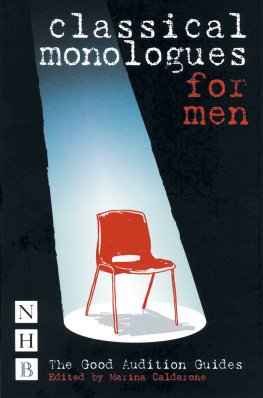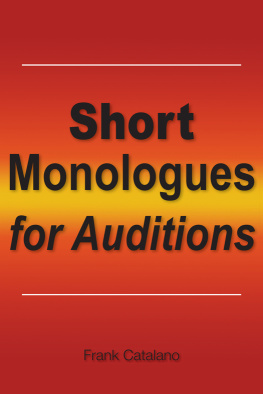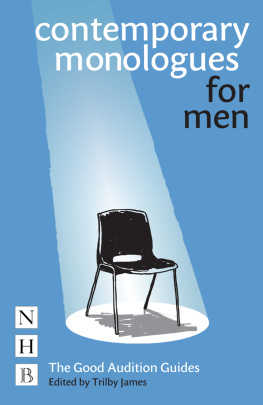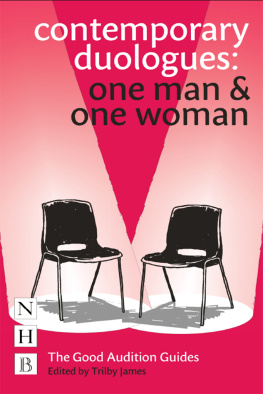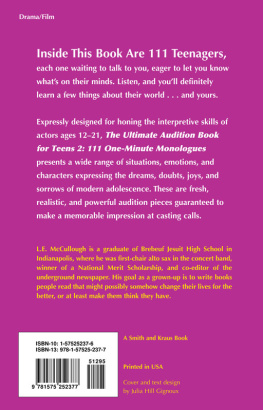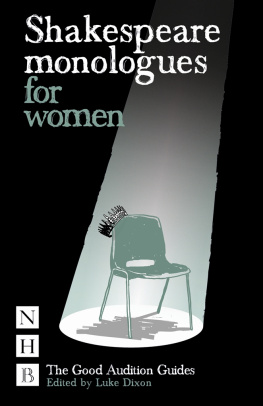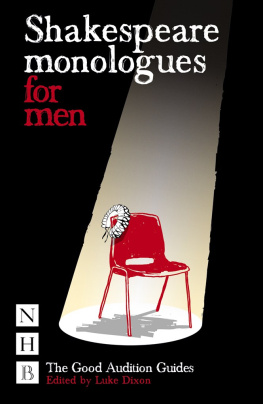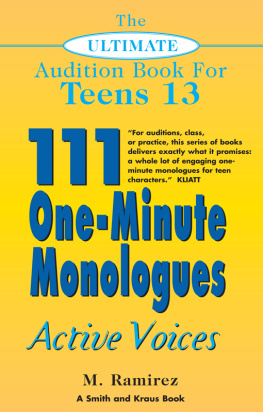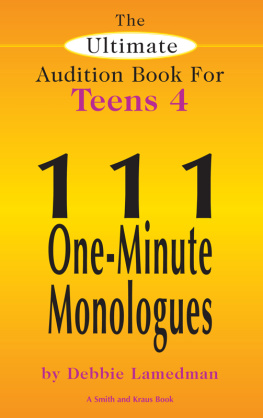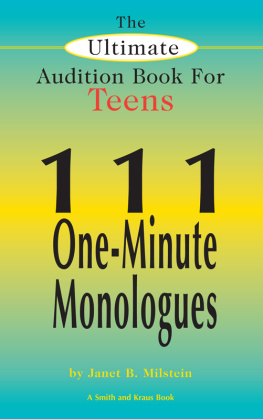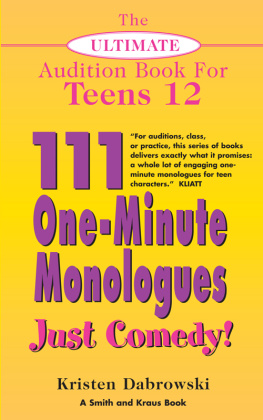The Good Audition Guides
CLASSICAL
MONOLOGUES
FOR MEN
edited and introduced by
MARINA CALDARONE

NICK HERN BOOKS
London
www.nickhernbooks.co.uk
Contents
Jason
from Medea by Euripides (431 BC)
Polydorus
from Hecuba by Euripides (c. 424 BC)
Polyneikes
from Thebans by Liz Lochhead (2003), after Sophocles and Euripides (5th century BC)
Pentheus
from Bacchae by Euripides (c. 405 BC)
Gripus
from Rudens by Plautus (c. 200 BC)
King Henry
from Henry VI, Part 3 by William Shakespeare (1592)
Faustus
from Doctor Faustus by Christopher Marlowe (c. 1592)
Lance
from The Two Gentlemen of Verona by William Shakespeare (1593)
Lodowick
from Edward III by William Shakespeare (1593)
Prince Arthur
from King John by William Shakespeare (1596)
Philip the Bastard
from King John by William Shakespeare (1596)
Angelo
from Measure for Measure by Shakespeare (c. 1603)
Lysander
from The Widows Tears by George Chapman (1604)
Hippolyto
from The Honest Whore by Thomas Dekker (1604)
Malheureux
from The Dutch Courtesan by John Marston (1604)
Richard Follywit
from A Mad World, My Masters by Thomas Middleton (1605)
Penitent Brothel
from A Mad World, My Masters by Thomas Middleton (1605)
Corvino
from Volpone by Ben Jonson (1606)
Vindice
from The Revengers Tragedy by Cyril Tourneur? (1607)
Petruchio
from The Tamer Tamed by John Fletcher (1611)
Ferdinand
from The Duchess of Malfi by John Webster (1613)
John Allwit
from A Chaste Maid in Cheapside by Thomas Middleton (1613)
Duarte
from The Custom of the Country by John Fletcher and Philip Massinger (c. 1619)
De Flores
from The Changeling by Thomas Middleton and William Rowley (1622)
Domitianus Caesar
from The Roman Actor by Philip Massinger (1626)
Peribanez
from Peribanez by Lope de Vega (c.1605-12)
Tristn
from The Dog in the Manger by Lope de Vega (c. 1613)
Basilio
from Life is a Dream by Pedro Caldern de la Barca (1630)
Don Juan
from Don Juan by Molire (1665)
Theseus
from Phedra by Jean Racine (1677)
Dryden
from The Man of Mode by George Etherege (1676)
Blunt
from The Rover by Aphra Behn (1677)
Loveless
from The Relapse by John Vanbrugh (1696)
Aimwell
from The Beaux Stratagem by George Farquhar (1707)
Bellmour
from The Tragedy of Jane Shore by Nicholas Rowe (1714)
Lord Townley
from The Provokd Husband by John Vanbrugh and Colley Cibber (1728)
Faulkland
from The Rivals by Richard Brinsley Sheridan (1775)
Lord Foppington
from A Trip to Scarborough by Richard Brinsley Sheridan (1777)
Lorenzo
from Lorenzaccio by Alfred de Musset (1834)
Khlestakov
from The Government Inspector by Nikolai Gogol (1836)
Stockmann 136
from An Enemy of the People by Henrik Ibsen (1882)
Ivanov
from Ivanov by Anton Chekhov (1887)
Jean
from Miss Julie by August Strindberg (1888)
Gerald Arbuthnot
from A Woman of No Importance by Oscar Wilde (1893)
Trigorin
from The Seagull by Anton Chekhov (1896)
Tempter
from To Damascus Part III by August Strindberg (1900)
Don Juan
from Man and Superman by George Bernard Shaw (1903)
Protasov
from Children of the Sun by Maxim Gorky (1905)
Duvallet
from Fannys First Play by George Bernard Shaw (1911)
Alfred Mangan
from Heartbreak House by George Bernard Shaw (1919)
Introduction
AN OPPORTUNITY, NOT A TEST
Lets assume you have an audition coming up. It may be for entrance to drama school, or for your first job after training, or it could be twenty years into your career and you have been asked to show your suitability for a specific role. Whatever the circumstances, the stakes are always high, and the somewhat artificial situation is undeniably nerve-racking. You want to find a monologue that does two jobs at once: it suits your particular skills and it demonstrates your particular suitability for the job you are interviewing for.
Before you begin, it is worth remembering that the person or panel auditioning you is just as anxious... for you. They will want to put you at your ease, get the very best out of you, and enable you to enjoy the experience so that they do as well. Adrenaline can be a useful energising factor, but the most valuable qualities when going into an audition are sound prepa ration and an ability to flex that most crucial of actors muscles: the imagination. Dare to make brave choices in the selection and delivery of your audition piece, and you will always stand out. View your audition as an opportunity, not a test.
USING THIS BOOK
The fifty speeches in this volume offer a new selection of classical monologues, divided into five distinct time periods from Ancient Greece to the 1930s. It is not an anthology of great speeches from dramatic literature but, rather, a miscellany of eclectic and original monologues. Many will prove challenging; some will seem immediately unsuitable for you; others will lead you down stimulating new avenues you hadnt considered before. Most of the monologues are taken in their entirety from plays; others have been shaped and moulded from a series of separate but closely connected passages to form a coherent speech.
The monologues are arranged in chronological order, within the five time periods: Classical Greek and Roman, Elizabethan and Jacobean, French and Spanish Golden Age, Restoration and Eighteenth Century, and Nineteenth and Early Twentieth Centuries. Before each section is a short introduction to the respective period, plus some pointers that may prove interesting or useful. By and large, however, the same rules for preparing your monologue apply for all time periods whether you are delivering Ancient Greek rhetoric, Renaissance tragic verse or savage Wildean wit.
Preceding each individual monologue is a checklist of the basic information you need to know before you can begin work: Who is speaking; Where; To whom and When the character is speaking; What has just happened in the play to provoke the speech; What the character wants and some possible objectives to play. After many of the speeches is a glossary explaining less familiar words and phrases.
This checklist isnt a substitute for reading the play from which the monologue is taken. Nor is it offered as a comprehensive guide or direction on how to rehearse and present the speech. Its a starting point, a springboard, from which you need to start making your own choices, in order to achieve ownership of the monologue and your performance of it.
The important thing is to keep your performance real and truthful. Many people put too much emphasis on the notion of classical text being very different and very much harder than contemporary text. Yes, classical text is harder insofar as the language can be less familiar, the syntax trickier, the form less comfortable but the heart of the work is exactly the same, albeit sometimes bigger. During the act of transformation, you will need to grow emotionally, linguistically, physically in order to speak these lines; the character remains a person inhabiting a real world not a classical one frozen in the past!

